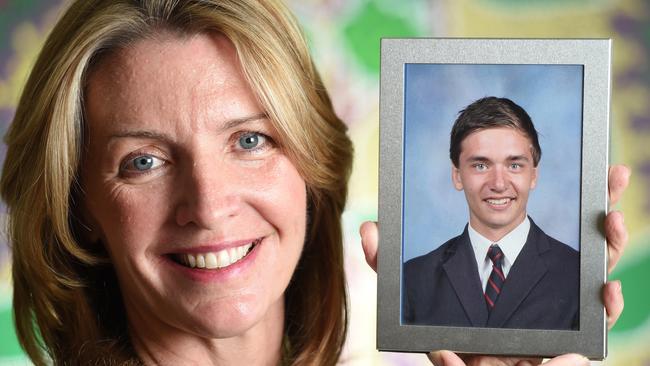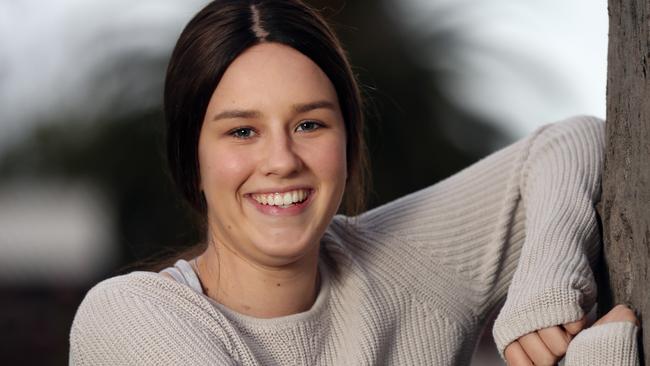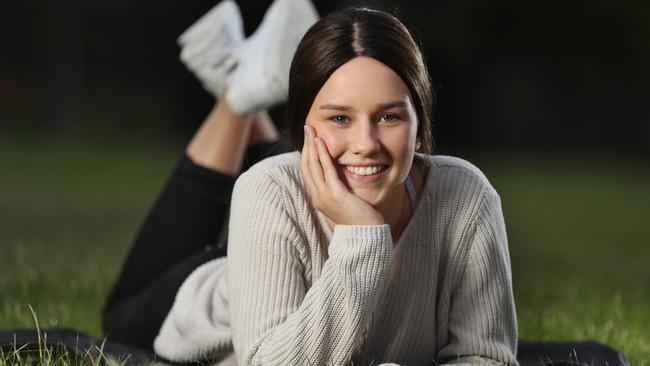Victorian mum and RCD Foundation founder raises $1 million for new brain cancer tool
A GUTSY Victorian mum is channeling her grief at losing her teenage son to brain cancer to help change the lives of other children suffering from the cruel disease.
VIC News
Don't miss out on the headlines from VIC News. Followed categories will be added to My News.
FOR years, Australian brain cancer specialists wanted access to overseas cutting-edge technology to personalise their treatment plans for children and improve patient outcomes.
At the same time, Victorian mother Liz Dawes was seeking to channel the devastation of losing her teenage son, Robert Connor Dawes, to the cruel disease into something tangible, positive and meaningful.
After founding a charity in his name, she sought meetings with the finest scientific and clinical paediatric specialists.
What did they really need to reverse the grim and stagnant statistics on brain cancer survival? The answer was molecular subtyping of tumours, which gives a better understanding of the makeup of the cancer to inform treatment.

Not only has the RCD Foundation raised $1 million for the Aim Brain Project, the federal government is matching her contribution.
The technology was able to spare Melbourne teenager Olivia Phelan, 16, excessive chemotherapy when her oncologist sent her brain tumour sample overseas.
She had been suffering headaches and dizziness, but it wasn’t until she began vomiting and having blurred vision she typed her symptoms into Google.
“It came up with brain tumour and I thought that’s a bit scary, but that’s not going to happen to me,” she said.
While her symptoms crept up on her slowly, the diagnosis and treatment was fast.
Within 24 hours of having a CT scan and MRI, which revealed she had a large mass on her brain stem, she was lying on the operating table at the Royal Children’s Hospital.
“I’d never heard of ependymoma (a form of brain cancer) and at first I couldn’t even say it,” she said.

Surgeons were able to cut out 95 per cent of her tumour, but the vexing question with brain cancer is always what to do next.
Attack the residual cancer cells too aggressively and the patient survives, but may be left with the legacy of their treatment; ranging from physical to mental impairments.
Yet not giving a patient enough chemotherapy or radiation can be an invitation for the tumour to regrow.
After weeks of worry, it was with great relief she discovered her tumour subtype would require no further treatment and latest scans show she is in remission.
Co-chair of the Aim Brain Project Dr Jordan Hansford, also the clinical lead in neuro-oncology at the Royal Children’s Hospital, said the molecular subtyping had just received ethics approval.
Children with certain forms of brain cancer will have their samples screened in Germany and Victoria to validate the local testing.

“By the end of the project, the idea is that testing would be approved to be used in here in Australia outside of research purposes and it’s very possible that we could then offer it to other adult centres in a non-research capacity,” he said.
Partners at Monash’s Hudson Institute of Medical Research and Monash Health are currently using the molecular profiling to test patient’s samples retrospectively.
Dr Handsford said the technology will inform their diagnostic and treatment decisions.
For instance it has already resulted in radiation doses being reduced for some forms of brain cancer.
“Overall survival for all tumour classes hasn’t changed in 20 to 30 years,” he said
It’s 65 to 70 per cent survival at five years, but included in that are tumours that have a 90 per cent survival rate and those that kill all they afflict.
Brain cancer accounts for more than one-third of cancer deaths in children aged under 10, yet it is one of the least understood diseases.

“We have essentially been using 100-year-old technology to diagnose children with brain tumours,” Dr Hansford said.
“It’s only been the last 10 years with genomics and epigenomics and some of the new technologies that we now understand that there are clearly different diseases and we have started to unlock the biology of them.”
For Liz, knowing that children will be spared long waits for test results and some of the side effects of treatment, brings immeasurable joy.
She watched her young athletic teenager lose movement on his right side and suffer vision and memory loss during his 16 months of treatment.
“I miss Connor, he is never not in my thoughts,” she said. “I feel love for him exactly as I did when he was living.
“Pouring my energy into our charity is a way to channel my love for him, my missing him.
“And to be able to improve the lives of Australian children with brain cancer means Connor’s name, his legacy lives on.”


